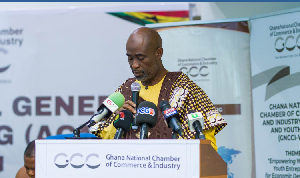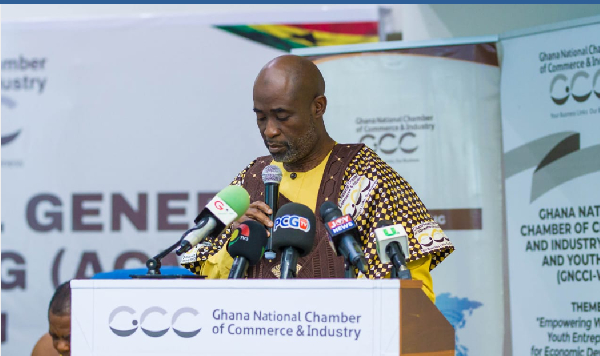 Stehane Miezan, the President of the GNCCI
Stehane Miezan, the President of the GNCCI
The Ghana National Chamber of Commerce and Industry (GNCCI) say Ghana must act swiftly to secure the competitiveness of its local firms.
Stehane Miezan, the President of the GNCCI, said this must be done especially in an era marked by rising global trade tensions and increasing efforts by nations to protect their domestic industries.
The President was speaking at the Chamber’s 49th Annual General Meeting on the theme: “Strengthening Local Businesses for Sustainable Growth and Development.”
Miezan said strengthening local businesses was very essential not only to withstand external shocks but also to take full advantage of regional and other trade opportunities.
He said the government’s renewed focus on creating jobs and shared prosperity for all was also deeply rooted in the development of a vibrant local economy driven by resilient indigenous enterprises.
He said this year’s theme and focus of Chamber therefore underscores the need for a collective effort going forward to create an enabling environment that empowers local businesses to grow sustainably, compete effectively, and contribute meaningfully to Ghana’s long-term development.
The President said throughout 2024, the Chamber organised a range of national and regional policy dialogues, high-level stakeholder engagements, and technical workshops to address key issues affecting business operations.
Notably, the Chamber played a significant role in influencing fiscal and
monetary reforms, contributing substantial inputs to the 2025 National Budget, and engaging policymakers on tax simplification, energy cost reduction, and industrial competitiveness.
He said the global economy in 2024 maintained a modest growth rate of 2.9 percent, consistent with the performance recorded in 2023.
However, economic activity continued to face significant headwinds arising from tight monetary policies and persistent geopolitical tensions.
In Africa, growth improved slightly to 3.3 percent in 2024, largely supported by government spending and resilient private consumption.
He said yet, high inflation, currency depreciation and rising debt-service obligations, continued to weaken the region’s economic resilience.
Miezan said in Ghana, the economy recorded a rebound, with GDP growth accelerating from 3.0 percent in 2023 to 5.7 percent in 2024 while under the IMF Extended Credit Facility programme.
He said GNCCI’s engagements with members and local businesses revealed an improved confidence in the Ghanaian economy, a trend similarly acknowledged by global credit rating agencies.
This renewed optimism stems from the governments and the Bank of Ghana’s prudent fiscal and monetary reforms, which have contributed to easing to some extent the cost of doing business and stimulating higher levels of production.
The President said despite achieving some level of positive growth in this year, there was still much work to be done, particularly in the short to medium term to sustain the growth we are experiencing this year.
There is the urgent need for government to intensify efforts to combat the illegal mining menace which is destroying the forest, waterbodies and putting cocoa production under threat.
“Expedite effort in repealing all related legislations allowing mining in once reserved forest, “he added.
He urged the government to maintain its current fiscal discipline to avoid future reliance on IMF credit facilities, whose reform measures often burdened businesses.
He said the government must implement policies that promoted investment and private sector growth in manufacturing, agriculture, and food production to drive structural transformation.
